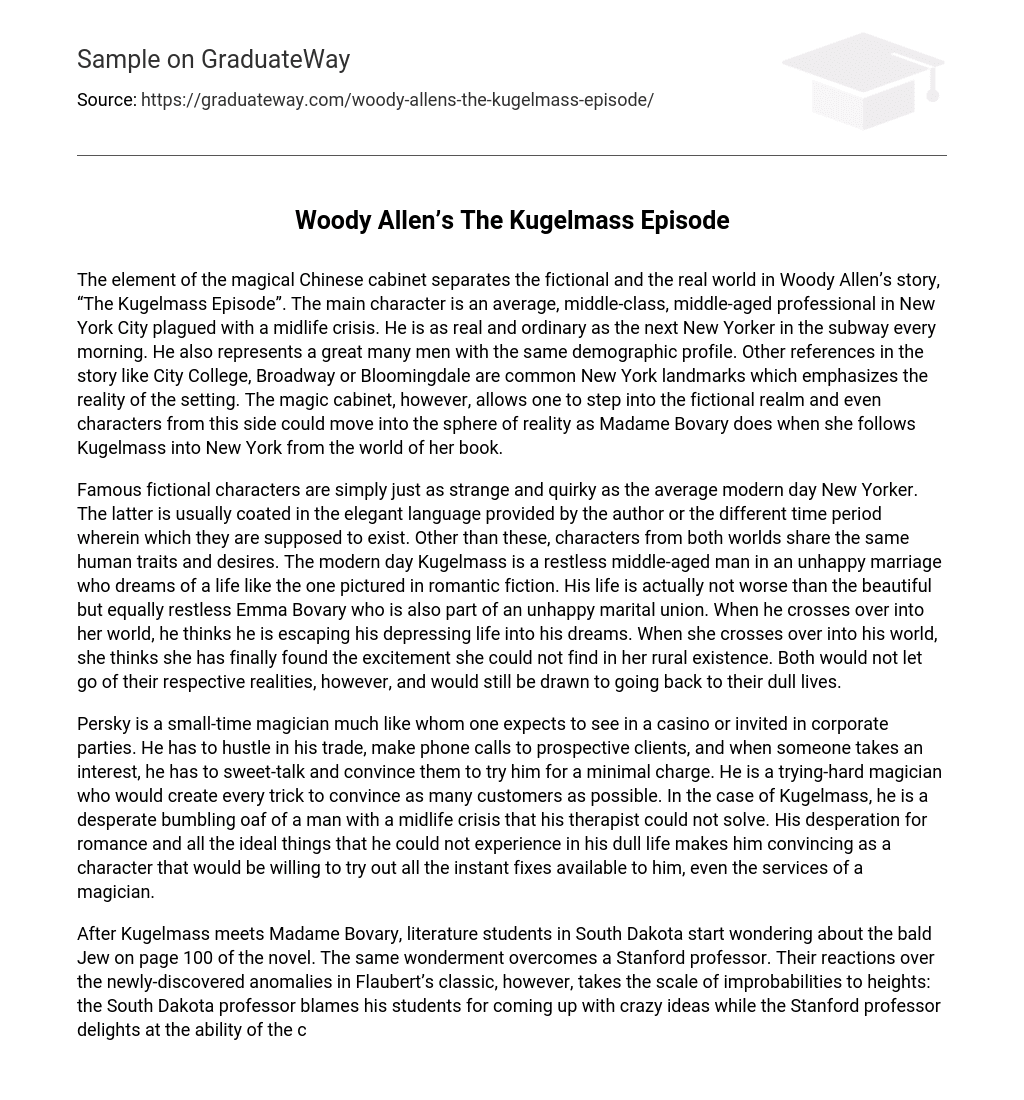The element of the magical Chinese cabinet separates the fictional and the real world in Woody Allen’s story, “The Kugelmass Episode”. The main character is an average, middle-class, middle-aged professional in New York City plagued with a midlife crisis. He is as real and ordinary as the next New Yorker in the subway every morning. He also represents a great many men with the same demographic profile. Other references in the story like City College, Broadway or Bloomingdale are common New York landmarks which emphasizes the reality of the setting. The magic cabinet, however, allows one to step into the fictional realm and even characters from this side could move into the sphere of reality as Madame Bovary does when she follows Kugelmass into New York from the world of her book.
Famous fictional characters are simply just as strange and quirky as the average modern day New Yorker. The latter is usually coated in the elegant language provided by the author or the different time period wherein which they are supposed to exist. Other than these, characters from both worlds share the same human traits and desires. The modern day Kugelmass is a restless middle-aged man in an unhappy marriage who dreams of a life like the one pictured in romantic fiction. His life is actually not worse than the beautiful but equally restless Emma Bovary who is also part of an unhappy marital union. When he crosses over into her world, he thinks he is escaping his depressing life into his dreams. When she crosses over into his world, she thinks she has finally found the excitement she could not find in her rural existence. Both would not let go of their respective realities, however, and would still be drawn to going back to their dull lives.
Persky is a small-time magician much like whom one expects to see in a casino or invited in corporate parties. He has to hustle in his trade, make phone calls to prospective clients, and when someone takes an interest, he has to sweet-talk and convince them to try him for a minimal charge. He is a trying-hard magician who would create every trick to convince as many customers as possible. In the case of Kugelmass, he is a desperate bumbling oaf of a man with a midlife crisis that his therapist could not solve. His desperation for romance and all the ideal things that he could not experience in his dull life makes him convincing as a character that would be willing to try out all the instant fixes available to him, even the services of a magician.
After Kugelmass meets Madame Bovary, literature students in South Dakota start wondering about the bald Jew on page 100 of the novel. The same wonderment overcomes a Stanford professor. Their reactions over the newly-discovered anomalies in Flaubert’s classic, however, takes the scale of improbabilities to heights: the South Dakota professor blames his students for coming up with crazy ideas while the Stanford professor delights at the ability of the classics to provide a new discovery in every reading. The matter-of-fact treatment of these and other absurdities in the story expands the comedy of The Kugelmass Episode.
In similarly-themed stories, the recipient of the three wishes usually ends up where he begins or even worse, the latter being unfortunately the case for Kugelmass. The one who is given the chance to make three wishes would be consumed by the incredible possibility of finally getting those things which he has long desired so much so that his greed would ultimately lead him into a sort of downfall. It is the same with Kugelmass. After he is given the opportunity to have an affair with Madame Bovary, and thus make his dreams come true, he does not leave behind his old life. He would like to stay married and retain his respectable reputation but would like to escape from it into the world of Flaubert’s novel when he wants. In the end, he gets an unexpected end for his inability to determine what he really wants in life: getting stuck in a Latin grammar being chased by a word.
Reference
Allen, Woody. “The Kugelmass Episode.”





